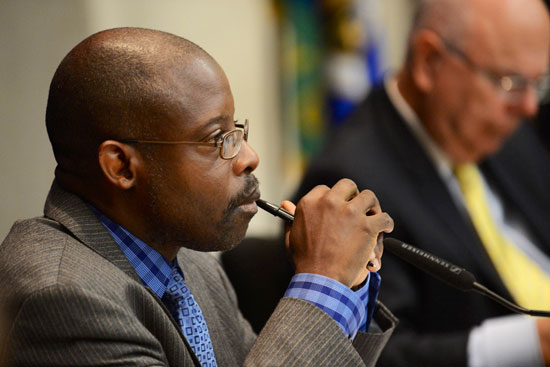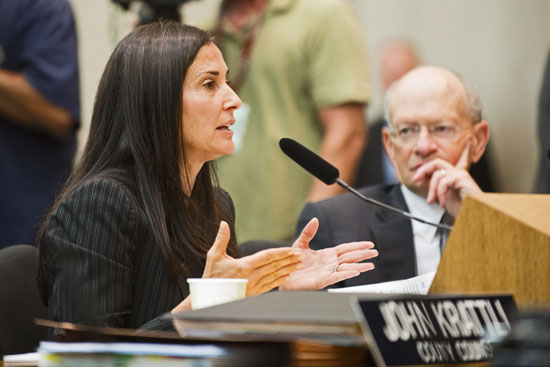From insider to investigator
August 2, 2013

David Sanders, chair of the new child protection commission, says his DCFS years give him a unique perspective.
The director of Los Angeles County’s Department of Children and Family Services was on the hot seat. Social workers in the agency had failed to protect a young boy from the fatal blows of his mother, despite being aware of earlier abuse allegations against her.
“Let’s not kid ourselves,” Supervisor Gloria Molina lectured the agency’s director, who’d been summoned before the board during its weekly meeting. “This is about people not doing their jobs.” Molina demanded that the director act more forcefully to fire his “ill-trained” workers.
That kind of dressing-down easily could have occurred on any number of recent days, as the Board of Supervisors has confronted the death of 8-year-old Gabriel Fernandez, who was allegedly tortured by his mother and boyfriend after a long history of abuse complaints. But the case that triggered Molina’s ire came in early 2004. And the director was not the current boss, Philip Browning, but David Sanders, who resigned in mid-2006.
Among the many who’ve held the top position at DCFS, Sanders was the only one to leave without being shown the door by the supervisors, his reputation intact. Now he’s voluntarily back in a new high-profile job; on Thursday, he was selected as chairman of the Blue Ribbon Commission on Child Protection by his nine colleagues during the panel’s inaugural meeting.
Each of the county’s five supervisors appointed two members to the commission, which was created on a split vote of the board to investigate systemic failures in L.A.’s child protection system. Sanders, selected by Supervisor Mark Ridley-Thomas, is the only panelist with a true insider’s perspective on the pressures and dynamics within the huge agency entrusted with the welfare of nearly 35,000 children. (Click here for a look at the other appointees.)
“I know what it’s like to have a crisis come up and turn the department in another direction,” Sanders said by phone, while making a connecting flight in Denver to his home in Seattle, where he’s now an executive with a non-profit. He says he’s “acutely aware” of not placing unnecessary demands on DCFS that would distract the agency from its primary mission of protecting children. The commission’s examination, he says, will go far beyond DCFS to investigate the performance of the broader network of agencies with a role in child safety, from law enforcement to the schools.
Since DCFS’s creation in 1984, arguably no director has had a bigger impact than Sanders—one that continues to shape the agency’s philosophical and financial strategy towards both foster care and family reunification.
In the past, the agency would receive tens of thousands of dollars in state and federal funds for every child placed in foster care. Believing this created a financial incentive to remove at-risk youngsters from their families, Sanders championed what he described at the time as “a revolutionary” funding model in which the agency would receive a flat amount to spend not only on foster care but on new services and programs to keep families together.
The so-called waiver, which took effect in 2007, has been widely praised for dramatically reducing the number of children in foster care. But in recent years concerns have surfaced over whether this shift in funding has created another kind of incentive, keeping kids in potentially dangerous family situations so DCFS can use the money it saves on foster care for other departmental priorities.
Asked how he’d approach having to investigate the impact on DCFS of one of his greatest legacies, Sanders said: “I don’t feel reluctance to attack any policy that isn’t relevant to the circumstances today…I don’t think anything is sacred, whether it was stuff I thought was important 10 years ago or today. My belief is that there is a fundamental responsibility to assure children are safe.”
Although it’s been seven years since Sanders’ departure, he says he still works closely with his former agency—one that he’s now expected to approach as an independent fact-finder.
Sanders is an executive vice president of the Seattle-based Casey Family Programs, founded in 1966 to focus on foster care and improving child welfare systems throughout the country. He says the non-profit organization has “done a number of initiatives with the county,” including helping Browning and other DCFS officials rewrite the agency’s policy manual. “I have a passion for the work in Los Angeles,” he says.
Sanders says his selection as chairman of the child protection commission was “very humbling,” especially considering “the incredibly impressive group” that’s been assembled by the Board of Supervisors. He says the commission “isn’t going to tolerate a repeat” of earlier investigative efforts in which recommendations for reform went unheeded.
“This,” he says, “is a group that is going to be very action oriented.”

Child advocate Leslie Gilbert-Lurie and retired Judge Terry Friedman were appointed by Supervisor Yaroslavsky.
Posted 8/2/13












 405 bridge work causes a stink
405 bridge work causes a stink

